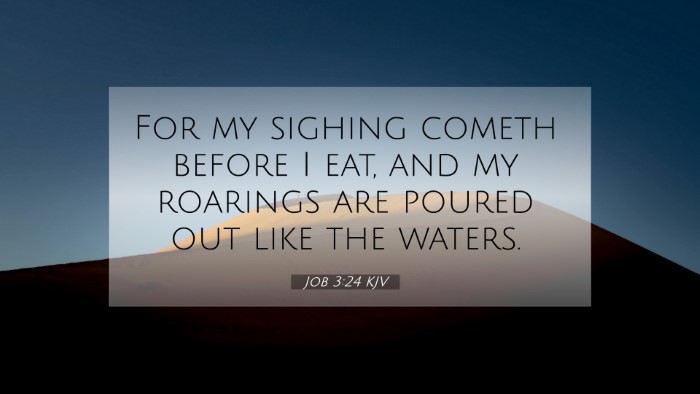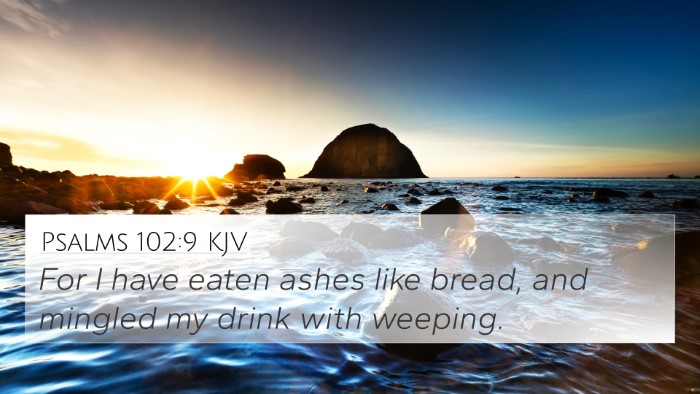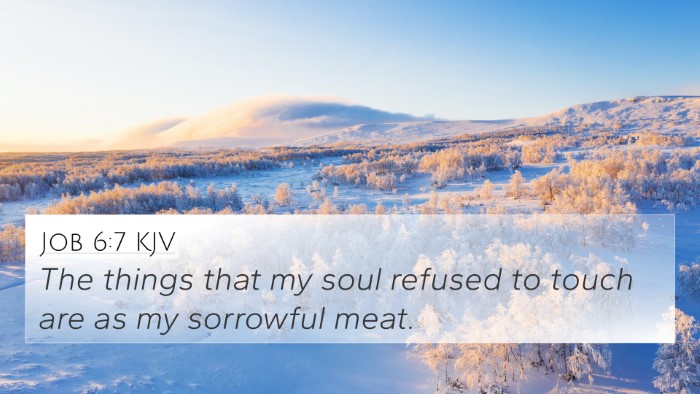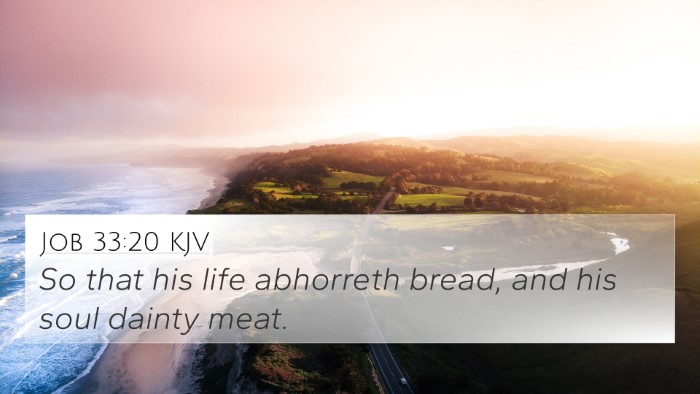Old Testament
Genesis Exodus Leviticus Numbers Deuteronomy Joshua Judges Ruth 1 Samuel 2 Samuel 1 Kings 2 Kings 1 Chronicles 2 Chronicles Ezra Nehemiah Esther Job Psalms Proverbs Ecclesiastes Song of Solomon Isaiah Jeremiah Lamentations Ezekiel Daniel Hosea Joel Amos Obadiah Jonah Micah Nahum Habakkuk Zephaniah Haggai Zechariah MalachiJob 3:24 Similar Verses
Job 3:24 Cross References
For my sighing cometh before I eat, and my roarings are poured out like the waters.
Uncover the Rich Themes and Topics of This Bible Verse
Listed below are the Bible themes associated with Job 3:24. We invite you to explore each theme to gain deeper insights into the Scriptures.
Job 3:24 Cross Reference Verses
This section features a detailed cross-reference designed to enrich your understanding of the Scriptures. Below, you will find carefully selected verses that echo the themes and teachings related to Job 3:24 KJV. Click on any image to explore detailed analyses of related Bible verses and uncover deeper theological insights.

Psalms 38:8 (KJV) »
I am feeble and sore broken: I have roared by reason of the disquietness of my heart.
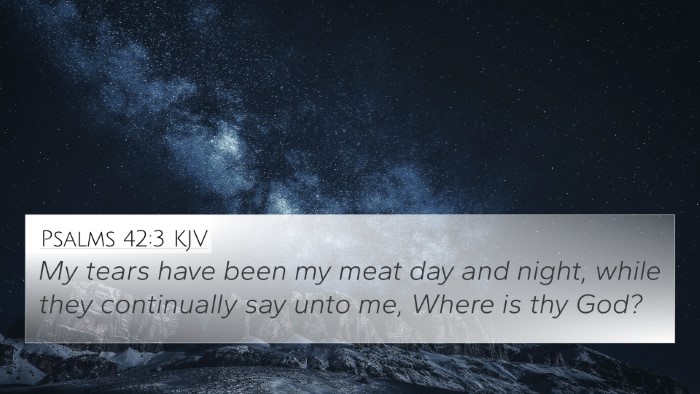
Psalms 42:3 (KJV) »
My tears have been my meat day and night, while they continually say unto me, Where is thy God?
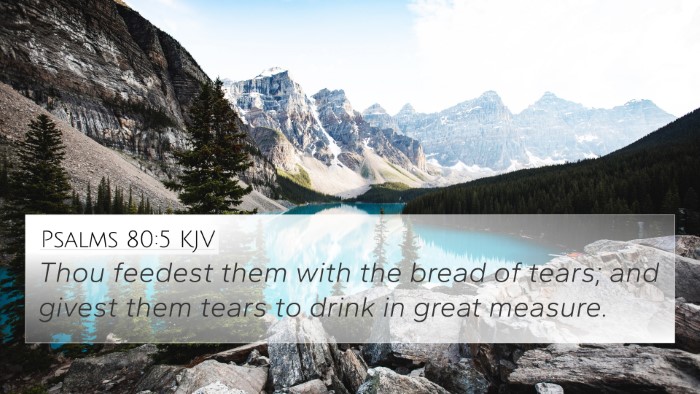
Psalms 80:5 (KJV) »
Thou feedest them with the bread of tears; and givest them tears to drink in great measure.
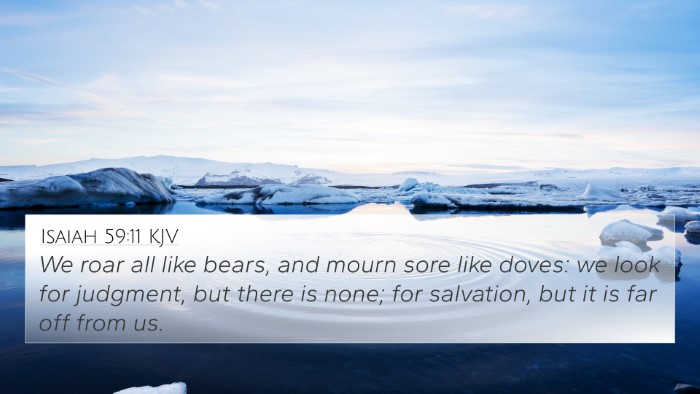
Isaiah 59:11 (KJV) »
We roar all like bears, and mourn sore like doves: we look for judgment, but there is none; for salvation, but it is far off from us.

Psalms 22:1 (KJV) »
My God, my God, why hast thou forsaken me? why art thou so far from helping me, and from the words of my roaring?

Job 7:19 (KJV) »
How long wilt thou not depart from me, nor let me alone till I swallow down my spittle?
Job 3:24 Verse Analysis and Similar Verses
Understanding Job 3:24
Job 3:24 states:
For my sighing cometh before I eat, and my roarings are poured out like the waters.
This poignant verse allows us a glimpse into Job's heavy suffering and emotional turmoil. In this analysis, we will explore the deeper meanings of this verse through insights from renowned public domain commentaries by Matthew Henry, Albert Barnes, and Adam Clarke.
Verse Analysis
Job, who is known for his profound patience, is at this moment expressing the depths of his agony. His sighs are depicted as incessant and overwhelming, as if they preclude even basic sustenance—illustrating the severity of his emotional state.
Commentary Insights
-
Matthew Henry:
Henry notes that Job is articulating a feeling of despair, indicating that his suffering is so great that it overshadows even the most basic human needs. His use of “sighing” and “roarings” conveys a sense of distress that is both internal and external, suggesting that his pain is inescapable.
-
Albert Barnes:
Barnes emphasizes the metaphorical meaning behind the “roarings.” He suggests that Job feels overwhelmed by his troubles, likening his cries to the tumultuous overflow of water. This imagery serves to highlight the intensity of his lamentation and his isolation in suffering.
-
Adam Clarke:
Clarke discusses the role of sighing in Job's life, indicating that it has become a more frequent occurrence than his appetite. He points to the psychological implications of grief, where emotional distress can lead to a physical response, reflecting how profoundly anguish can affect one's health and wellbeing.
Thematic Connections
Job 3:24 serves as a significant point of reflection when considering themes of suffering and despair in the Bible. The verse connects to various other scriptural passages that echo similar sentiments of emotional pain, distress, and the relationship between physical and psychological states. Below are some thematic Bible verse connections:
- Psalm 42:3: "My tears have been my meat day and night." - This verse relates to Job's lamentations, illustrating a similar state of anguish.
- Psalm 38:6: "I am troubled; I am bowed down greatly; I go mourning all the day long." - This verse captures Job's prolonged suffering state.
- Ecclesiastes 2:17: "Therefore I hated life; because the work that is wrought under the sun is grievous unto me." - A reflection of despair experienced by those in deep sorrow.
- Lamentations 3:48: "Mine eye runneth down with rivers of water for the destruction of the daughter of my people." - It parallels Job's emotional devastation.
- Matthew 5:4: "Blessed are they that mourn: for they shall be comforted." - This verse provides solace which Job is yearning for in his painful state.
- John 11:35: "Jesus wept." - Reflects deep emotional response to suffering, showcasing even the Redeemer's empathy.
- 2 Corinthians 1:4: "Who comforteth us in all our tribulation." - Suggests the possibility of comfort in suffering, a theme Job struggles to grasp.
Cross-Referencing Biblical Texts
Utilizing tools for Bible cross-referencing can enhance one’s understanding of cross-referenced themes and emotions expressed in the Scriptures. Consider exploring the following:
- Utilizing a Bible concordance to identify similar themes in lamentations.
- Engaging in cross-reference Bible study to explore connections between Job and the Psalms.
- Applying Bible reference resources to map emotional states across both Old and New Testament writings.
Conclusion
Job 3:24 encapsulates the anguish experienced by Job in his state of despair. The elaborate sighs and roarings communicated in this verse ring true with the emotional turmoil expressed throughout the Bible. Cross-referencing Job with other scriptures allows for a richer understanding of the Biblical narrative surrounding human suffering and divine empathy.
Through discovering and analyzing these connections, we deepen our comprehension of the intricate tapestry of scripture’s messages on pain, grief, and ultimately, hope.


